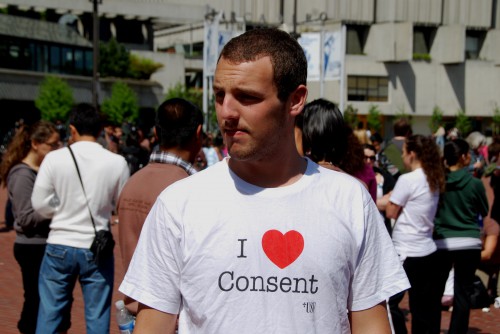By Madeline Scovotti
Over the last two weeks, cases of sexual assault have occurred at five colleges across Massachusetts. As a female student who unintentionally, but frequently, walks the streets of Boston alone, it’s unnerving to read what can happen even on the smallest and most private campuses.
At Framingham State University, four students were suspended in connection with two alleged sexual assaults on one female student in both an off-campus residence and an on-campus residence. FSU spokesman Daniel Maguza told The Boston Globe that he did not recall an instance at the university where so many students were accused in a sexual assault. The assaults took place late Saturday, Sept. 27 and early Sunday, Sept. 28, the Globe reported.
At Stonehill College, a victim told campus police that she was assaulted on a campus pathway as she was walking home at 2 a.m on Sept. 28. She wasn’t walking down a dark alleyway when she was assaulted, she was attacked in a public place that she frequently passes through. Sexual assault can happen anywhere and at anytime, no matter how comfortable the victim may be with the area.
But cases such as these go far beyond our local community, and colleges across the country are facing increased pressure to crack down on sexual assault on their campuses. Only last week did President Barack Obama launch the “It’s On Us” campaign to not only raise awareness about sexual assault on college campuses, but to put an end to it for good.
It is estimated that one in five women experience sexual assault during their time in college. Of that 20 percent, less than half will report their assaults, and even then only a fraction of the offenders are punished, according to the “It’s On Us” Campaign website.

Sexual assault can no longer be something that we sweep under the rug or talk about only behind closed doors. Sexual assaults happen on campuses almost every day and it is crucial that we not only support the victims but also commit to taking steps to prevent it in the future.
This past week, California Governor Jerry Brown signed a bill requiring all colleges that receive state money for student financial aid to enforce a standard for “affirmative consent,” or “yes means yes.” The bill essentially lays out an updated sexual conduct handbook, which outlines steps students can take to ensure all parties are engaging in consensual sexual contact.
There needs to be clear consent every step of the way by both partners. Silence does not mean yes. An unclear answer does not mean yes. An assumed yes from the other’s body language does not mean yes. A drunken slur does not mean yes. Only yes means yes. A partner has every right to revoke consent after initially giving it. Being intoxicated is not an excuse for sexual assault.
Considering the recent cases across Massachusetts, it might be time for the state to adopt a bill like California’s. Clear consent is important because it ensures that all parties involved are in agreement at every step of the sexual encounter. No matter how awkward it may seem to keep asking if what’s happening is okay, it will ensure neither party feels uncomfortable which will lead to a better sexual experience overall. It will also ensure that things don’t get out of hand and that assault, in any form, does not occur.
In all of the recent sexual assault cases across Massachusetts, the victim was alone when she was attacked. Maybe of these assaults could have been prevented by using the buddy system. There are steps that we can take to prevent sexual assault on our campus, we just need to be more aware of them.
So in light of the recent incidents at college campuses in our state community, let’s all make an effort to prevent sexual assault right here in our Suffolk community. Don’t be afraid to speak up if you feel or see that something is wrong. Travel with a buddy, especially at night.
Never go out without a plan as to how you are going to be able to safely get home. Be a good partner and respect the wishes of the person other involved. Finally, be a good friend and support the victims of sexual assault. If we all do our part, we can put an end to sexual assault and make our college community a safe place for every student.













